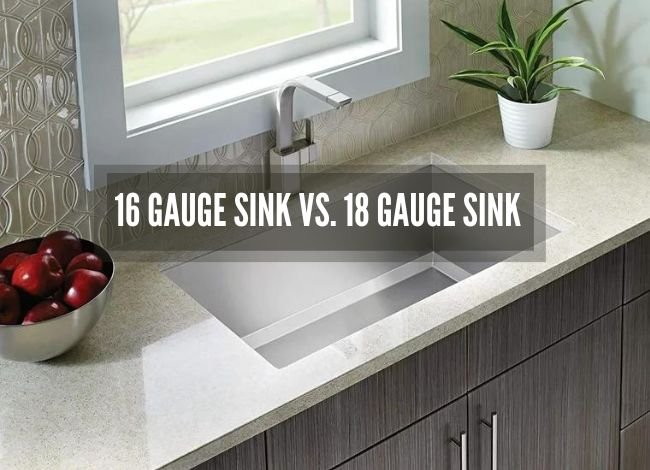What Is The Gauge Number?
The gauge number in kitchen sinks refers to the thickness of the metal used in their construction. Lower gauge numbers indicate thicker, more durable metal. For instance, a 16 gauge sink is thicker and sturdier than an 18 gauge sink. This thickness impacts the sink’s resistance to dents and scratches, as well as noise reduction when water hits the basin. Generally, a lower gauge means a higher quality sink, but other factors like material quality and finish also play a crucial role in overall durability and performance.
Popular 16 Gauge Kitchen Sinks
16 gauge sinks are a top choice for homeowners prioritizing durability and quality. These sinks are often made of high-grade stainless steel, offering a robust build that resists dents and noise. Popular models include the Kraus Standart PRO, known for its deep basin and noise-defend technology, and the Ruvati Workstation, which comes with built-in accessories like a cutting board and colander. These sinks are ideal for heavy-duty use, frequent cooking, or larger households, where the sink sees a lot of wear and tear.
Popular 18 Gauge Kitchen Sinks
18 gauge sinks, slightly thinner than their 16 gauge counterparts, offer a balance between durability and cost-effectiveness. They are suitable for moderate use in average households. Notable models include the Moen Kelsa, which blends functionality with an elegant design, and the Frigidaire Undermount, known for its easy installation and sleek appearance. These sinks are perfect for those who want a quality sink without the heaviness or cost of a thicker gauge, making them a practical choice for many kitchens.
16 Gauge Sink vs. 18 Gauge Sink: Comparison Table
| Feature | 16 Gauge Sink | 18 Gauge Sink |
|---|---|---|
| Thickness | Thicker (approximately 0.0625 inches) | Thinner (approximately 0.05 inches) |
| Durability | More durable due to thicker steel | Less durable compared to 16 gauge |
| Resistance to Denting | Higher resistance to denting | Lower resistance to denting |
| Sound Dampening | Better sound dampening due to thickness | Less sound dampening |
| Weight | Heavier | Lighter |
| Cost | Generally more expensive | Usually less expensive |
| Common Use | Often used in professional or high-end kitchens | Common in residential kitchens |
| Installation | May require more support due to weight | Easier to install due to being lighter |
16 Gauge Sink vs 18 Gauge Sink: Understanding the Differences
Thickness and Durability
The thickness is a primary factor when comparing 16-gauge and 18-gauge stainless steel sinks. The 16 gauge sinks, being thicker, offer greater durability. They’re less prone to denting and vibrating, making them ideal for heavy-duty use. Thicker sinks also tend to have a longer lifespan, resisting wear and tear better over time. This thickness provides a sturdy, robust feel, especially in busy kitchens or where heavy pots and pans are frequently used.
Thicker is Better
In the realm of stainless steel sinks, thicker means better quality. A 16 gauge sink is approximately 0.0625 inches thick, compared to the slightly thinner 0.05 inches of an 18 gauge sink. This difference might seem small, but it significantly impacts the sink’s overall quality and functionality. Thicker sinks are not only more resistant to physical damage but also offer better noise insulation. This means a quieter kitchen environment, as the thicker metal reduces the sound of water and utensils hitting the sink’s base.
Super Corrosion Resistance
Corrosion resistance is a crucial feature in kitchen sinks. The 16 gauge sinks generally provide superior corrosion resistance compared to 18 gauge sinks. This is due to the thicker material being less susceptible to pitting and corrosion over time, especially in environments with acidic foods or harsh cleaning products. The robust construction of 16 gauge sinks ensures they maintain their appearance and functionality longer, making them a wise long-term investment for any kitchen.
Joint Strength
The joint strength of a sink refers to how well the sink’s components are bonded together, impacting its overall durability and integrity. In this aspect, 16 gauge sinks typically have stronger joints compared to 18 gauge sinks. The thicker material allows for more robust welding or seamless construction, ensuring that the sink remains intact and leak-free over many years of use. This enhanced joint strength is particularly beneficial for undermount sinks, where stability and attachment to the countertop are crucial for long-term performance.
Who is the Winner?
Determining a winner in the 16 gauge vs. 18 gauge sink debate depends on personal needs and preferences. If you prioritize longevity and can handle a heftier price tag, a 16-gauge sink is the way to go. Its robust build makes it ideal for heavy use. On the other hand, an 18-gauge sink offers a fine balance of quality and affordability for moderate use and is a more budget-friendly option. Ultimately, the best choice is one that aligns with your kitchen usage, aesthetic preferences, and budget.
Conclusion
The choice between a 16 gauge and an 18 gauge sink depends on various factors, including usage intensity, budget, and personal preference. A 16 gauge sink offers superior durability and noise reduction, making it suitable for kitchens with heavy usage. Meanwhile, an 18 gauge sink provides a more cost-effective solution for average daily use. Both options have popular models offering unique features and designs, ensuring that there’s a perfect sink for every kitchen. It’s essential to weigh these factors carefully to make the best decision for your home.
Frequently Asked Questions
Question: Is a 16 gauge sink more durable than an 18 gauge sink?
Answer: Yes, generally speaking, a 16 gauge sink is considered more durable due to its thicker construction, making it less prone to denting and noise.
Question: Does the thickness of the sink gauge affect soundproofing?
Answer: Yes, thicker gauges like 16 gauge offer better sound insulation, reducing the noise from running water and clanging dishes.
Question: Are there noticeable cost differences between 16 and 18-gauge sinks?
Answer: Typically, 16 gauge sinks are more expensive due to the higher material cost and increased durability.
Question: Can the gauge of a sink impact its appearance?
Answer: Not significantly. The gauge primarily affects durability and soundproofing, but both gauges can have a similar finish and aesthetic appeal.
Question: Is installation different for 16 gauge versus 18 gauge sinks?
Answer: Installation is generally the same for both, but a 16 gauge sink might require additional support due to its extra weight.
Question: How do I choose between a 16 gauge and an 18 gauge sink?
Answer: Consider factors like usage frequency, budget, and the importance of durability and sound insulation in your decision.
Question: Are there any maintenance differences between the two gauges?
Answer: Maintenance is similar for both, but 16 gauge sinks might be more resistant to damage and thus require less repair over time.
Question: Do both gauges come in various styles and sizes?
Answer: Yes, both 16 and 18 gauge sinks are available in a variety of styles, sizes, and shapes to fit different kitchen designs.
Question: Is one gauge better for certain types of homes or kitchens?
Answer: A 16 gauge sink is often preferred in high-use or professional kitchens due to its durability, while an 18 gauge sink can be sufficient for standard home use.
Question: Can I find eco-friendly options in both 16 and 18-gauge sinks?
Answer: Yes, there are eco-friendly options available in both gauges, made with recyclable materials and sustainable manufacturing processes.
Question: What should I consider if I’m on a tight budget?
Answer: If budget is a concern, an 18 gauge sink can be a more cost-effective choice while still offering good quality and durability.




